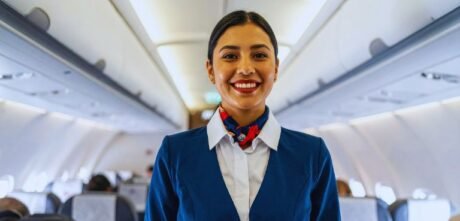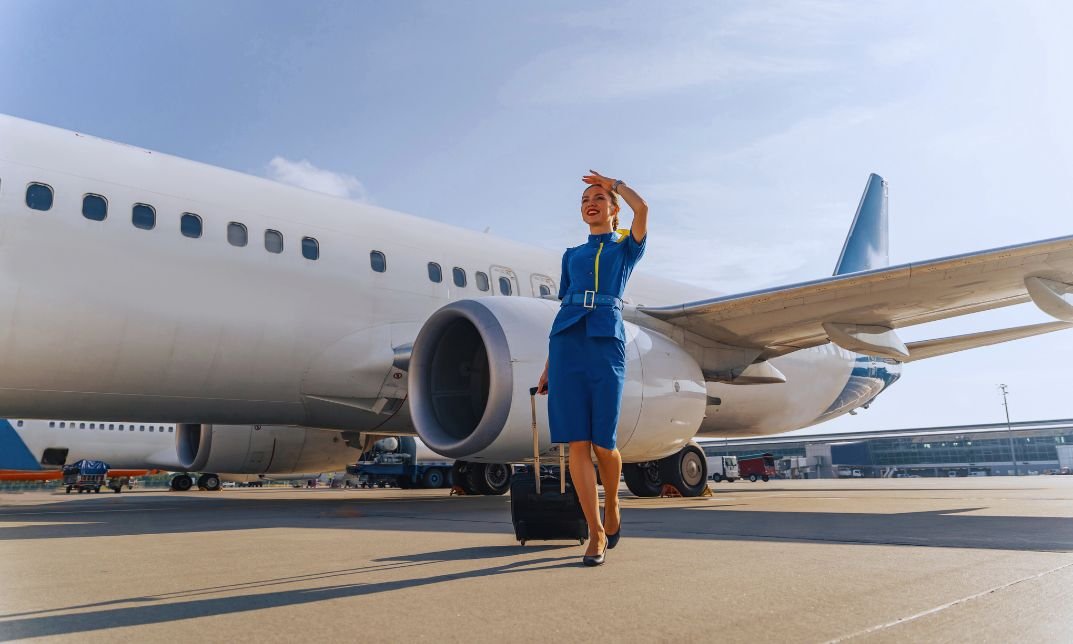No products in the cart.
The first question almost every future flight attendant asks is simple: how much money do airline attendants make? The answer is not a single figure. A new recruit in the UK often begins with around sixteen to twenty thousand pounds per year. That is the base. When you add per diem allowances, overtime, commissions, and long-haul premiums, the total climbs fast. Within a few years, most attendants earn thirty to forty thousand. Senior staff move toward fifty and even sixty thousand.
This role is not a flat paycheck. Every trip you fly, every overnight stay, and every premium duty adds something extra. That is why understanding how flight attendant pay works is the key to planning your career.

Why Pay Varies So Much
Many people see the headline average salary of flight attendant roles and assume everyone earns the same. The truth is more complex. Several factors decide your pay.
Seniority
Seniority drives everything. The longer you work, the higher your hourly rate. Seniority also gives you the first choice on rosters. That means more long-haul trips and better allowances. A new starter will always earn less than a crew member with ten years in the job.
Airline Choice
The airline you work for makes a huge difference. Salary for British Airways cabin crew looks very different from Ryanair or easyJet. BA offers a structured ladder with solid benefits. Virgin Atlantic offers generous long-haul allowances. Budget airlines pay less but sometimes add commission to balance.
Base Location
Where you are based matters. Crew in London or Manchester see more international trips. That means more hours, more per diem, and higher pay overall. Being based close to your airport also saves money on commuting.
Aircraft and Role
Wide-body aircraft usually mean longer flights. Longer flights mean more hours on duty and higher pay. Premium roles such as purser or lead crew add an hourly bonus.
Contracts and Union Rules
Your contract sets out pay for boarding, delays, and overtime. At BA, unions negotiate protections that matter during disruption. Events like a British Airways crew overtime Heathrow closure show how valuable these rules can be.
How Flight Attendants Actually Get Paid
Understanding the mechanics of pay helps you see where the numbers come from.
Block Time
You are paid for “block time.” That means from the moment the aircraft door closes until it opens at arrival. Any time spent boarding passengers or waiting on the ground may not count.
Per Diem
Per diem is a meal and expense allowance for every duty hour away from base. In the UK it usually adds two to three pounds per hour. On a long-haul roster that means three to six hundred pounds each month. Per diem is often untaxed if linked to overnights, which makes it more valuable.
Boarding Pay and Delays
Some airlines now pay boarding time. British Airways does not. If boarding drags on, you might not earn for that time. Delay pay depends on the contract. Some airlines offer partial pay when passengers are on board during long waits.
Commissions and Extras
Onboard sales also matter. Selling duty free or food can add a small commission to your paycheck. It is not huge but can build up over the year.
British Airways Cabin Crew Pay Explained
When people ask, how much do British Airways air hostesses earn, the answer depends on experience, base location, and route type. Unlike a flat salary, BA cabin crew income is layered with multiple components.

Starting Pay (Years 0–1):
New entrants usually begin on a base salary of £20,000–£23,000. Training pay is lower, but once you start flying, you move onto the full rate. In the first year, most crew add £4,000–£5,000 in per diem allowances and commissions. That brings total annual earnings to around £25,000–£28,000.
Early Career (Years 2–5):
With a few years of service, base pay rises steadily to £24,000–£27,000. By this point, you are rostered for more long-haul routes. Long-haul trips bring overnight allowances that can add £500–£800 per month. Typical total pay in this stage ranges from £33,000 to £38,000.
Mid Career and Senior Roles (Years 6–10):
Crew with six or more years’ service often move into senior cabin crew roles. Pursers and cabin managers earn £35,000–£42,000 in base pay. Allowances push this into the £45,000–£55,000 range. Heathrow-based staff tend to reach the higher end because of the long-haul focus. Gatwick and regional bases lean toward shorter flights, which limits the allowance totals.
Top Earners (10+ Years):
The most senior crew, particularly pursers at Heathrow, can exceed £60,000 in total pay during busy years. Disruptions, such as a British Airways crew overtime Heathrow closure, also increase earnings because of union-secured overtime rules. This level of income is uncommon in other UK airlines, which is why BA remains attractive for long-term careers.
Other Pay Factors at BA:
- Overtime: Heathrow is a disruption hotspot. Delays and cancellations often lead to extra hours. Crew are protected with overtime rates that can add several thousand pounds per year.
- Seasonal Demand: Summer and Christmas periods bring more long-haul rosters, boosting allowances.
- Aircraft Type: Flying the A380 or 777 means longer trips, higher block hours, and bigger per diems compared to short-haul Airbus flights.
BA crew do not earn a flat figure. The British Airways cabin crew wage is a layered package that grows with seniority, base, and route type. New hires earn £25,000–£28,000 in the first year, mid-level crew average £33,000–£38,000, and senior staff with long-haul rosters can exceed £50,000–£60,000.
Comparing British Airways with Other UK Airlines
When evaluating the British Airways cabin crew wage, it helps to place it against other UK airlines. While pay is always a key factor, crew also weigh stability, travel perks, and lifestyle. Let’s look at how BA compares.
Virgin Atlantic
Virgin is BA’s closest competitor for long-haul glamour. New joiners earn around £21,000–£25,000 as base salary. Allowances boost this by £6,000–£10,000, depending on routes. Mid-level crew usually total £30,000–£38,000. Virgin is known for generous per diems and a strong staff culture. However, the airline runs fewer routes than BA, so career growth can be slower. Many crew members describe Virgin as fun and stylish, but BA offers more variety and global reach.
easyJet
As a short-haul focused airline, easyJet has a very different pay structure. Entry-level pay is about £18,000–£22,000. With small allowances, mid-level crew usually make £24,000–£28,000. Because there are no long-haul flights, per diems stay limited. The work-life balance is better for those who prefer being home most nights. For crew who want international travel and higher earning potential, BA provides a stronger long-term package.
Ryanair
Ryanair starts new recruits at £17,000–£21,000. Much of the earnings come from commission on onboard sales. Some crew thrive in this model, while others dislike the heavy reliance on selling. Overtime and allowances remain limited because of short-haul schedules. For someone seeking quick entry into the industry, Ryanair offers opportunities, but compared to BA’s structured progression and benefits, the pay feels leaner and less secure.
Jet2 and TUI Airways
Both Jet2 and TUI start around £19,000–£24,000 at entry. Salaries grow slowly, usually reaching mid-£20Ks or low £30Ks. Seasonal demand drives income spikes during summer and holiday periods, but quieter months mean less flying and lower take-home pay. These airlines focus on leisure routes, so you’ll see more Mediterranean flights than global layovers. Compared with BA, which offers steady income across the year and a wider variety of destinations, Jet2 and TUI are less stable for those seeking a career path rather than seasonal work.
How BA Stands Out
British Airways remains the gold standard in the UK. Its crew enjoy not only higher average salaries but also better long-term career development. The salary for British Airways cabin crew scales faster than that of most rivals. BA also gives access to long-haul flying, global allowances, and strong union protections, especially around Heathrow. The result is more consistent pay, greater progression, and the chance to reach £50,000–£60,000 levels that budget and leisure carriers rarely match.
If you want short-haul stability and more home time, airlines like easyJet or Jet2 may suit. If you want prestige, global routes, and stronger pay progression, BA clearly leads. For many UK crew, the choice comes down to whether they value lifestyle balance or long-term earnings potential.
Real Pay Scenarios
Numbers on a page help, but real examples show the full picture.
A new BA crew member on short-haul earns about sixteen pounds per block hour. With seventy block hours in a month, that is one thousand one hundred twenty pounds. Add two hundred in per diem and one hundred in commission, and the total is around one thousand four hundred before tax.
A mid-level Virgin Atlantic crew member flying long-haul earns about twenty-two pounds per block hour. With eighty block hours, that is one thousand seven hundred sixty pounds. Add five hundred in per diem and another two hundred fifty in international premiums, and the total climbs to two thousand five hundred before tax.
A senior purser at BA based at Heathrow earns thirty-two pounds per block hour. With eighty-five block hours, the base is two thousand seven hundred twenty pounds. Add seven hundred in per diem, four hundred in lead role premiums, and one hundred fifty in commission, and the total nears four thousand before tax.
Tax and National Insurance
Gross pay is only part of the story. Taxes reduce your take-home. A BA crew member on twenty-eight thousand pounds pays about two thousand eight hundred in income tax and two thousand in National Insurance. The net is around twenty-three thousand two hundred per year, or four hundred forty-five pounds per week. That is why budgeting is key when starting out.
Benefits Beyond the Paycheck
The salary for British Airways cabin crew is only one part of the package. Benefits add real value.
Travel perks include standby flights, discounted tickets, and buddy passes for family. Healthcare benefits cover medical, dental, and vision needs, plus mental health support. Retirement benefits include a company pension scheme. Paid time off grows with seniority, covering holiday and sick days. For many, these benefits equal thousands of pounds per year.
The Lifestyle: Rewards and Challenges
Cabin crew life is exciting but demanding. Expect to work nights, weekends, and holidays. Short-haul flights bring same-day returns but tight schedules. Long-haul means layovers in new cities, but also jet lag and time away from home. Crew learn to adapt quickly. They enjoy time off between trips and the chance to explore places around the world. Many describe a strong sense of team culture, with colleagues becoming a second family.
Training and How to Start
Becoming a cabin crew member does not require a degree. Airlines usually ask for GCSEs in English and maths, plus strong customer service skills. Applicants must pass medical and background checks. Training runs four to six weeks. It covers safety, first aid, security, and emergency drills. At the end, you receive your CAA Attestation of Cabin Crew. Training pay is small, but full pay begins once you start flying.
Career Progression Opportunities
The career ladder moves step by step. You begin as a flight attendant. After some years, you become a senior cabin crew or purser. From there, you might progress to cabin manager or in-flight manager. Beyond that, roles in training, recruitment, or ground operations open up. Some experienced crew members move into VIP private jets. Those roles can pay six figures but require strong experience in premium cabins. Each step raises your pay and responsibility.
Extended FAQs
Do crew get free hotels on layovers?
Yes. Airlines cover hotels, meals, and transport during layovers.
Do tattoos stop you from getting hired?
Visible tattoos often do. Hidden tattoos usually pass if not seen in uniform.
Can you wear glasses?
Yes. Glasses and contact lenses are fine if vision meets the standard.
Do crew get paid during delays?
Some airlines pay guarantees, others do not. It depends on the contract.
Is overtime common?
Yes. Heathrow closures or disruptions often mean overtime.
How much do British Airways air hostesses earn after ten years?
Most earn forty to fifty thousand, with senior pursers topping fifty-five thousand.
Do you need to swim?
Yes. Most airlines require swimming twenty-five metres unaided.
Is per diem taxed?
Per diem linked to overnights is usually untaxed. One-day duties may count as income.
Final Thoughts: Flying for a Living
So, how much money do airline attendants make in 2025? In the UK, a new crew start with around twenty thousand pounds. With seniority and long-haul flights, most rise to forty to sixty thousand. In the U.S., entry sits around thirty to forty thousand dollars, with senior staff often doubling that.
The role is not just a job. It is a lifestyle that blends travel, adventure, and growth. The pay builds year by year, and the benefits add real value. With planning and patience, you can create a rewarding and stable career.
Want to start your journey as cabin crew? Enrol in our Air Cabin Crew Online Diploma Course at Wise Campus and prepare for take-off.






